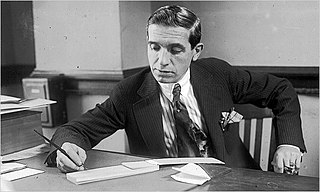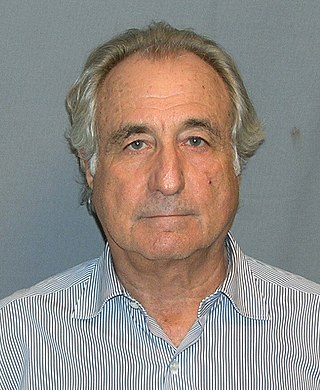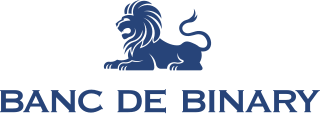Related Research Articles

A Ponzi scheme is a form of fraud that lures investors and pays profits to earlier investors with funds from more recent investors. Named after Italian businessman Charles Ponzi, this type of scheme misleads investors by either falsely suggesting that profits are derived from legitimate business activities, or by exaggerating the extent and profitability of the legitimate business activities, leveraging new investments to fabricate or supplement these profits. A Ponzi scheme can maintain the illusion of a sustainable business as long as investors continue to contribute new funds, and as long as most of the investors do not demand full repayment or lose faith in the non-existent assets they are purported to own.
The 2003 mutual fund scandal was the result of the discovery of illegal late trading and market timing practices on the part of certain hedge fund and mutual fund companies.
A binary option is a financial exotic option in which the payoff is either some fixed monetary amount or nothing at all. The two main types of binary options are the cash-or-nothing binary option and the asset-or-nothing binary option. The former pays some fixed amount of cash if the option expires in-the-money while the latter pays the value of the underlying security. They are also called all-or-nothing options, digital options, and fixed return options (FROs).

Riggs Bank was a bank headquartered in Washington, D.C. For most of its history, it was the largest bank headquartered in that city. On May 13, 2005, after the exposure of several money laundering scandals, the bank was acquired by PNC Financial Services.
Alberto Vilar, a.k.a. Albert Vilar was an American investment manager who became particularly known as a patron of opera companies, performing arts organizations, and educational institutions. Following the collapse of his investment firm, Amerindo Investment Advisors, he was tried and convicted in November 2008 on charges of money laundering, investment advisor fraud, securities fraud, mail and wire fraud. He was sentenced in February 2010 to nine years in prison and released in 2018.
Affinity fraud is a form of investment fraud in which the fraudster preys upon members of identifiable groups, such as religious or ethnic communities, language minorities, the elderly, or professional groups. The fraudsters who promote affinity scams frequently are – or successfully pretend to be – members of the group. They often enlist respected community or religious leaders from within the group to spread the word about the scheme, by convincing those people that a fraudulent investment is legitimate and worthwhile. Many times, those leaders become unwitting victims of the fraudster's ruse.
Irvin Pelletier is a Quebec politician and notary. He was the Member of National Assembly of Quebec for the riding of Rimouski for the Parti Québécois.
Sunshine Empire was a Multi Level Marketing (MLM) company, set up in 2006, based in Singapore. It is now defunct, with assets frozen by the Singapore Court. The company is listed by the Singapore Government's Monetary Authority in its Investor's Alert List, for possibly running investment schemes without authority. After investigation by the Commercial Affairs Department (CAD) of the Singapore Police and a court trial, Sunshine Empire's Directors were charged with and found guilty of fraud, criminal breach of trust and falsifying accounts.
The Satyam Computer Services scandal was India's largest corporate fraud until 2010. The founder and directors of India-based outsourcing company Satyam Computer Services, falsified the accounts, inflated the share price, and stole large sums from the company. Much of this was invested in property. The swindle was discovered in late 2008 when the Hyderabad property market collapsed, leaving a trail back to Satyam. The scandal was brought to light in 2009 when chairman Byrraju Ramalinga Raju confessed that the company's accounts had been falsified.

Frank DiPascali Jr. was an American fraudster and financier who was a key lieutenant of Bernie Madoff for three decades. He referred to himself as the company's "director of options trading" and as "chief financial officer". For a number of years, he played a key part in the daily operation of the Madoff investment scandal, later recounting how he helped manipulate billions of dollars in account statements so clients would believe that they were creating wealth for them.

The Madoff investment scandal was a major case of stock and securities fraud discovered in late 2008. In December of that year, Bernie Madoff, the former Nasdaq chairman and founder of the Wall Street firm Bernard L. Madoff Investment Securities LLC, admitted that the wealth management arm of his business was an elaborate multi-billion-dollar Ponzi scheme.

Participants in the Madoff investment scandal included employees of Bernard Madoff's investment firm with specific knowledge of the Ponzi scheme, a three-person accounting firm that assembled his reports, and a network of feeder funds that invested their clients' money with Madoff while collecting significant fees. Madoff avoided most direct financial scrutiny by accepting investments only through these feeder funds, while obtaining false auditing statements for his firm. The liquidation trustee of Madoff's firm has implicated managers of the feeder funds for ignoring signs of Madoff's deception.
Bertram Earl Jones is a Canadian unlicensed investment adviser who pleaded guilty to running a Ponzi scheme that CBC News has reported cost his victims "a conservative estimate of about $51.3 million taken between 1982 and 2009". After pleading guilty to two charges of fraud in 2010, he was sentenced to 11 years in prison. After serving four years of his sentence, Jones was released on March 20, 2014.

Corruption in Canada is the use of political power for private gain by Canadian government officials.
Daniel Bonventre is one of five former Madoff employees charged in the Madoff investment scandal.
International Investment Group (IIG) is an American financial institution that specializes in short-term trade finance and commercial finance with a focus on emerging markets. Through its affiliate IIG Capital it provides financing to small and medium-sized merchants, traders and processors with a need for supply chain financing.

Banc De Binary was an Israeli financial firm with a history of regulatory issues on three continents. On January 9, 2017, the company announced that it would be closing due to negative press coverage and its tarnished reputation. The firm also surrendered its brokerage license with the Cyprus Securities and Exchange Commission (CySEC) removing its ability to legally trade in the European Union. Its 2014 revenues were reported as $100 million.

The Stars Group Inc. was a Canadian gaming and online gambling company headquartered in Toronto, Ontario, Canada. Its shares were traded on Nasdaq and the Toronto Stock Exchange. It primarily operated poker, casino, and sports betting products under the PokerStars, Full Tilt Poker, BetStars, and Fox Bet brands.
AtkinsRéalis Group Inc., previously known as SNC-Lavalin Group Inc., is a Canadian company based in Montreal that provides engineering, procurement, and construction (EPC) services to various industries, including mining and metallurgy, environment and water, infrastructure, and clean energy. AtkinsRéalis was the largest construction company, by revenue, in Canada, as of 2021.
Daddy Goes Ptarmigan Hunting is a Canadian drama film, directed by Robert Morin and released in 2008. The film stars François Papineau as Vincent Lemieux, a wealthy financier on the run after facing fraud charges, who is driving through remote northern Quebec and recording a video message for his daughters.
References
- ↑ Affaire Norbourg : Pauline Marois poursuit Gilles Taillon | Politique | Radio-Canada.ca
- ↑ Investors want public inquiry into Norbourg scandal
- 1 2 Norbourg : LE SCANDALE ÉCLATE | Économie et affaires | Radio-Canada.ca
- 1 2 3 Former head of Norbourg bankrupt
- ↑ Norbourg : ce qu'il en reste
- ↑ Norbourg: les stratagèmes utilisés
- ↑ Montreal fraud trial for former Norbourg president Lacroix starts
- ↑ Quebec lays 51 charges against Norbourg founder
- ↑ Québec Hebdo > Tribune libre > Commission d’enquête publique sur le scandale Norbourg réclamée
- ↑ 1er recours collectif suite au scandale Norbourg Ceinture rose, troisième sacoche!
- ↑ Norbourg: les investisseurs sans protection
- 1 2 Le recours collectif rebondit à l'Assemblée nationale - LCN - National [usurped]
- ↑ Investors getting cash back in Norbourg bankruptcy
- ↑ "Norbourg victims to get $55 million". CBC. January 19, 2011.
- ↑ Le juge refuse la plupart des témoins de la défense - LCN - Faits divers [usurped]
- ↑ ARGENT - Un député souhaite le retour en affaires de Vincent Lacroix! Archived 2008-04-18 at the Wayback Machine
- ↑ RCMP arrest 6 in Norbourg fraud case, including ex-CEO June 18, 2008 CBC.ca
- ↑ "Papa à la chasse aux lagopèdes : Make money, salut bonsoir!". Voir , November 20, 2008.
- ↑ Élizabeth Lepage-Boily, "Vincent-Guillaume Otis brille dans la nouvelle bande-annonce de Norbourg". Showbizz, December 14, 2021.